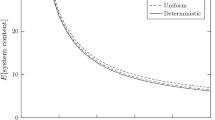Abstract
This paper analyzes a single server queueing system in which service is alternated between two queues and the server requires a (finite) switchover time to switch from one queue to the other. The distinction from classical results is that the sequence of switchover times from each of the queues need not be i.i.d. nor independent from each other; each sequence is merely required to form a stationary ergodic sequence. With the help of stochastic recursive equations explicit expressions are derived for a number of performance measures, most notably for the average delay of a customer and the average queue lengths under different service disciplines. With these expressions a comparison is made between the service disciplines and the influence of correlation is studied. Finally, through a number of examples it is shown that the correlation can significantly increase the mean delay and the average queue lengths indicating that the correlation between switchover times should not be ignored. This has important implications for communication systems in which a common communication channel is shared amongst various users and where the time between consecutive data transfers is correlated (for example in ad-hoc networks). In addition to this a number of notational mistakes in well-known existing literature are pointed out.
Similar content being viewed by others
References
Eitan Altman, Stochastic recursive equations with applications to queues with dependent vacations, {Annals of Operations Research} 112(1) (2002) 43–61.
Eitan Altman, On stochastic recursive equations and infinite server queues, in Proc. of IEEE Infocom 2005., (Miami, FL, 2005).
Eitan Altman, Chadi Barakat, and Konstantin Avratchenkov, A stochastic model of TCP/IP with stationary ergodic random losses, in: ACM-Sigcomm. (Aug. 28-Sept. 1 2000). See also INRIA Research Report RR-3824.
Eitan Altman, Tania Jimenez and Daniel Kofman, DPS queues with stationary ergodic service times and the performance of TCP in overload, in: Proceedings of IEEE Infocom., (Hong-Kong, March 2004).
Eitan Altman, Panagiotis Konstantopoulos, and Zhen Liu, Stability, monotonicity and invariant quantities in general polling systems, {Queuing Systems} 11 (1992) 35–57. Special issue on ‘Polling Systems’.
Thomas Bonald, M. Jonckheere and A. Proutière, Insensitive load balancing, in: ACM Sigmetrics Performance Evaluation Review., volume 32, pages 367–377, June 2004.
Thomas Bonald, A. Proutière, G. Régnié and J.W. Roberts, Insensitivity results in statistical bandwidth sharing, in: ITC., number 17, (Salvador, Brazil, 2001).
Leo Breiman, Probability., Vol. 7 of Classics in Applied Mathematics. (SIAM, Philadelphia, 1992).
Robert B. Cooper, Shun-Chen Niu and Mandyam M Srinivasan, A decomposition theorem for polling models: The switchover times are effectively additive, {Operations Research} 44(4) (1996) 629–633.
Richard Durrett, Probability: Theory and Examples., Wadsworth & Brooks/Cole Statistics/Probability Series, (Brooks/Cole, 1991).
Martin Eisenberg, Queues with periodic service and changeover time, {Operations Research} 20(2) (1972) 440–451.
S.W. Fuhrmann and Robert B. Cooper, Stochastic decompositions in the M./G./1 queue with generalized vacations, {Operations Research} 33(5) (1985) 1117–1129.
J.D.C.Little, A proof for the queueing formula: L. = λ W., {Operations Research} 9 (1961) 383–387.
Alain Jean-Marie and Philippe Robert, On the transient behaviour of the processor sharing queue, {QUESTA} 17(1/2) (1994) 129–136.
Leonard Kleinrock, Queueing Systems., Vol. I: Theory. (John Wiley and Sons, 1976).
T. Ozawa, An analysis for multi-queueing systems with cyclic-service discipline—models with exhaustive and gated services. Technical Report 4, The Institute of Electronics, Information and Communication Engineers (IEICE)-(in Japanese), 1987.
Jack S. Sykes, Simplified analysis of an alternating-priority queueing model with setup times, {Operations Research} 18(6) (1970) 1182–1192.
Hideaki Takagi, Analysis of Polling Systems. (MIT Press, Cambridge, Massachusetts, 1986).
Hideaki Takagi, Queueing analysis of polling models: An update, {Stochastic Analysis of Computer and Communication Systems} (1990) 267–318.
Hideaki Takagi, Queueing Analysis, Vacations and Priority Systems, Part 1., vol. 1. (The Netherlands, 1991, Elsevier Science Publishers B.V.)
Gil Zussman, Uri Yechiali and Adrian Segall, Exact probabilistic analysis of the limited scheduling algorithm for symmetrical bluetooth piconets, in: Personal Wireless Communications (PWC). (Venice Italy, 2003).
Author information
Authors and Affiliations
Corresponding author
Additional information
AMS subject classification: 68M20, 60J85
A shorter version of this work has been published in the proceedings of IEEE Infocom 2005.
This work was partly sponsored by the EURONGI network of excellence.
Rights and permissions
About this article
Cite this article
Groenevelt, R., Altman, E. Analysis of Alternating-Priority Queueing Models with (Cross) Correlated Switchover Times. Queueing Syst 51, 199–247 (2005). https://doi.org/10.1007/s11134-005-3751-8
Received:
Revised:
Issue Date:
DOI: https://doi.org/10.1007/s11134-005-3751-8




